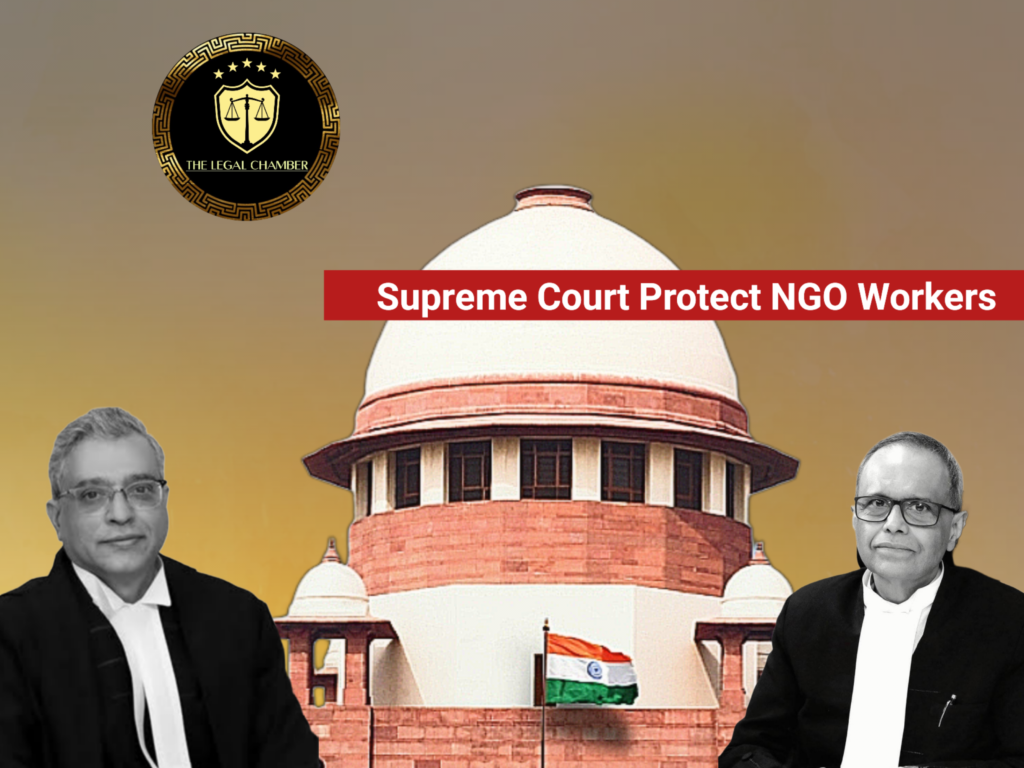
The Supreme Court quashed criminal proceedings under Sections 186 (obstruction) and 353 IPC (assault on public servant) against anti-trafficking activists, holding the allegations lacked mens rea and essential ingredients of the offences. It ruled the prosecution was legally barred under Section 195 CrPC (requiring complaint by aggrieved public servant) and non-cognizable without magistrate approval under Section 155(2) CrPC. The Court emphasized that inherent powers under Section 482 CrPC must prevent vexatious prosecutions, especially where prima facie allegations fail to disclose offences. The judgment reaffirmed that disputed facts in FIRs must be scrutinized to safeguard liberty against abuse of process.
Facts Of The Case:
The case involved Umashankar Yadav and another appellant, members of Guria, a reputed anti-trafficking NGO in Uttar Pradesh. Acting on a complaint about bonded/child labor at a Varanasi brick kiln, they accompanied a government team (including labor officers and police) for an inspection on 06.06.2014. During the raid, a dispute arose when the appellants transported laborers/children to the police station for interrogation, contrary to officials’ preference for on-site recording. The brick kiln owner later secured their release. The labor team’s leader (Raja Ram Dubey) filed an FIR alleging obstruction of official duty (Sections 186/353 IPC) and initially kidnapping (Section 363 IPC, later dropped).
The appellants countered that they acted in good faith to protect victims, citing a fax to the District Magistrate reporting the owner’s interference. Despite their defense, the Trial Court took cognizance, upheld by the Allahabad High Court (02.07.2015), which dismissed their quashing petition under Section 482 CrPC, citing “disputed facts.” The Supreme Court (08.05.2025) reversed this, noting the FIR’s allegations failed to establish mens rea or criminal force, and highlighted procedural illegality (lack of magistrate approval under Section 155(2) CrPC and violation of Section 195 CrPC). The prosecution was deemed vexatious, protecting activists from misuse of law.
Procedural History:
The procedural history of the case began with the registration of FIR No. 93 of 2014 at Lohta Police Station, Varanasi, under Sections 186 (obstruction), 353 (assault on public servant), and 363 IPC (kidnapping, later dropped). After investigation, a chargesheet was filed under Sections 186 and 353 IPC, and the Magistrate took cognizance of the offences. The appellants, aggrieved by the cognizance order, approached the Allahabad High Court under Section 482 CrPC seeking quashing of the proceedings. The High Court dismissed their petition on 02.07.2015, holding that the allegations raised “disputed questions of fact” unsuitable for adjudication at the preliminary stage.
The appellants then filed a Special Leave Petition (SLP) before the Supreme Court, which was converted into Criminal Appeal No. 439 of 2018. On 08.05.2025, the Supreme Court allowed the appeal, quashing the entire prosecution. It held that the High Court failed to scrutinize whether the FIR disclosed prima facie offences and overlooked mandatory legal requirements under Sections 155(2) and 195 CrPC. The apex court emphasized that Section 482 CrPC empowers courts to prevent abuse of process, even at preliminary stages, and condemned the mechanical dismissal of the quashing petition.
Court Observation:
The Supreme Court made several critical observations while quashing the criminal proceedings. It emphasized that the allegations in the FIR did not establish the essential ingredients of Sections 186 or 353 IPC, as there was no evidence of mens rea (intent to obstruct) or use of criminal force against public servants. The Court noted that the appellants’ actions—transporting laborers to the police station—stemmed from a bona fide disagreement with officials over interrogation methods, not malice. It highlighted the procedural illegality of the case, pointing out that: (1) Section 186 IPC is non-cognizable, yet no magistrate approval was obtained under Section 155(2) CrPC; and (2) cognizance was taken on a police report despite Section 195 CrPC mandating a complaint by the aggrieved public servant. The Bench rebuked the High Court for its perfunctory dismissal of the quashing petition, stressing that Section 482 CrPC requires scrutiny of whether allegations prima facie disclose offences. It condemned the prosecution as vexatious and malicious, citing the labor department’s hostile stance and unfounded insinuations (e.g., bribery claims). The judgment reaffirmed that courts must act as sentinels of liberty to prevent abuse of process, especially against activists acting in public interest.
Final Decision & Judgement:
The Supreme Court delivered a decisive verdict, allowing the appeal and quashing the entire criminal proceedings against the appellants. In its judgment dated 08.05.2025, the Court held that the FIR and chargesheet failed to disclose any prima facie case under Sections 186 or 353 IPC, as the allegations lacked both the essential elements of criminal force and the requisite mens rea to obstruct public servants. The Bench categorically ruled that the prosecution was legally unsustainable due to multiple jurisdictional flaws: (1) the non-compliance with Section 155(2) CrPC (mandating magistrate approval for non-cognizable offences); and (2) the violation of Section 195 CrPC, which bars cognizance of offences like Section 186 IPC unless initiated by the aggrieved public servant.
The Court rebuked the High Court for its mechanical approach in dismissing the quashing petition, underscoring that Section 482 CrPC empowers constitutional courts to intervene where proceedings are patently abusive or legally barred. While allowing the appeal, the Bench did not impose costs, but directed all pending applications to stand disposed. The judgment serves as a precedent against weaponizing criminal law against bona fide social work, reinforcing the judiciary’s role as a bulwark against arbitrary state action.
Case Details:
Case Title: Umashankar Yadav & Anr. vs. State of Uttar Pradesh & Anr. Citation: 2025 INSC 653 (Reportable) Appeal Number: Criminal Appeal No. 439 of 2018 Date of Judgment: May 8, 2025 Bench: Justice Joymalya Bagchi (Author of the Judgment) & Justice Pamidighantam Sri Narasimha
Download The Judgement Here